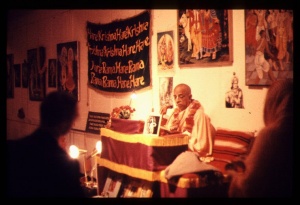SB 10.89.26-27

A.C. Bhaktivedanta Swami Prabhupada
TEXTS 26-27
tām arjuna upaśrutya
karhicit keśavāntike
parete navame bāle
brāhmaṇaṁ samabhāṣata
kiṁ svid brahmaṁs tvan-nivāse
iha nāsti dhanur-dharaḥ
rājanya-bandhur ete vai
brāhmaṇāḥ satram āsate
SYNONYMS
tām—that (lamentation); arjunaḥ—Arjuna; upaśrutya—happening to hear; karhicit—once; keśava—of Lord Kṛṣṇa; antike—in the proximity; parete—having died; navame—the ninth; bāle—child; brāhmaṇam—to the brāhmaṇa; samabhāṣata—he said; kim svit—whether; brahman—O brāhmaṇa; tvat—your; nivāse—at the home; iha—here; na asti—there is not; dhanuḥ-dharaḥ—holding his bow in his hand; rājanya-bandhuḥ—a fallen member of the royal order; ete—these (kṣatriyas); vaḥ—indeed; brāhmaṇāḥ—(like) brāhmaṇas; satre—at a major fire sacrifice; āsate—are present.
TRANSLATION
When the ninth child died, Arjuna, who was near Lord Keśava, happened to overhear the brāhmaṇa lamenting. Thus Arjuna addressed the brāhmaṇa: "What is the matter, my dear brāhmaṇa? Isn't there some lowly member of the royal order here who can at least stand before your house with a bow in his hand? These kṣatriyas are behaving as if they were brāhmaṇas idly engaged in fire sacrifices.